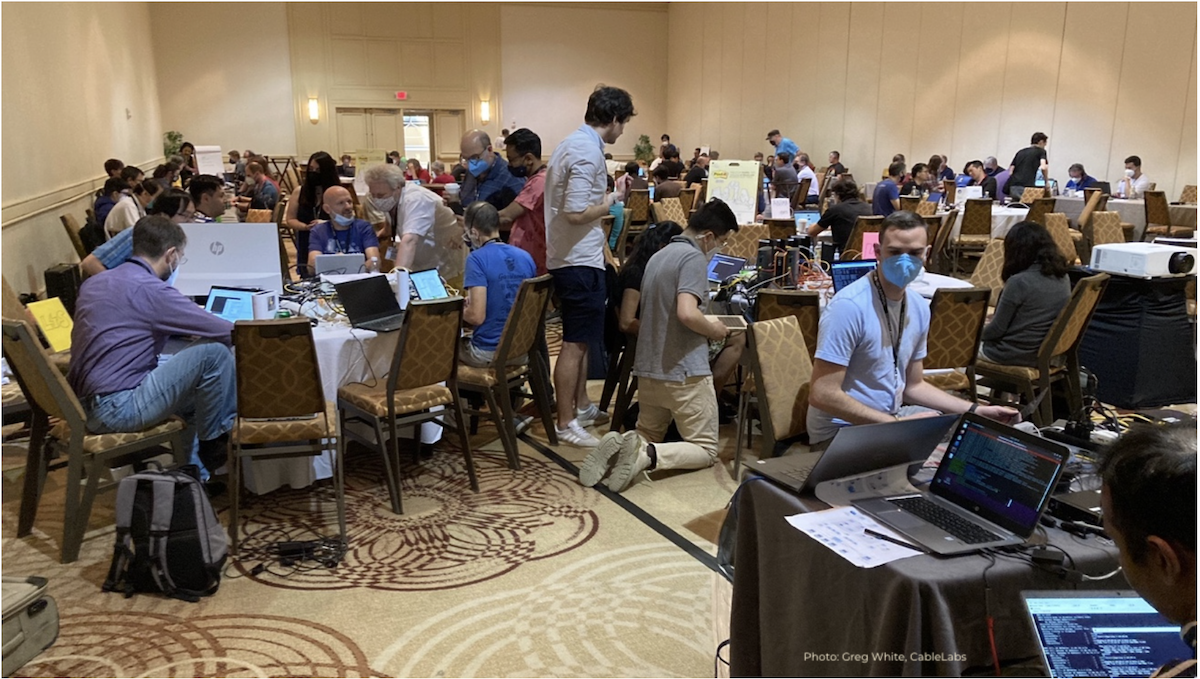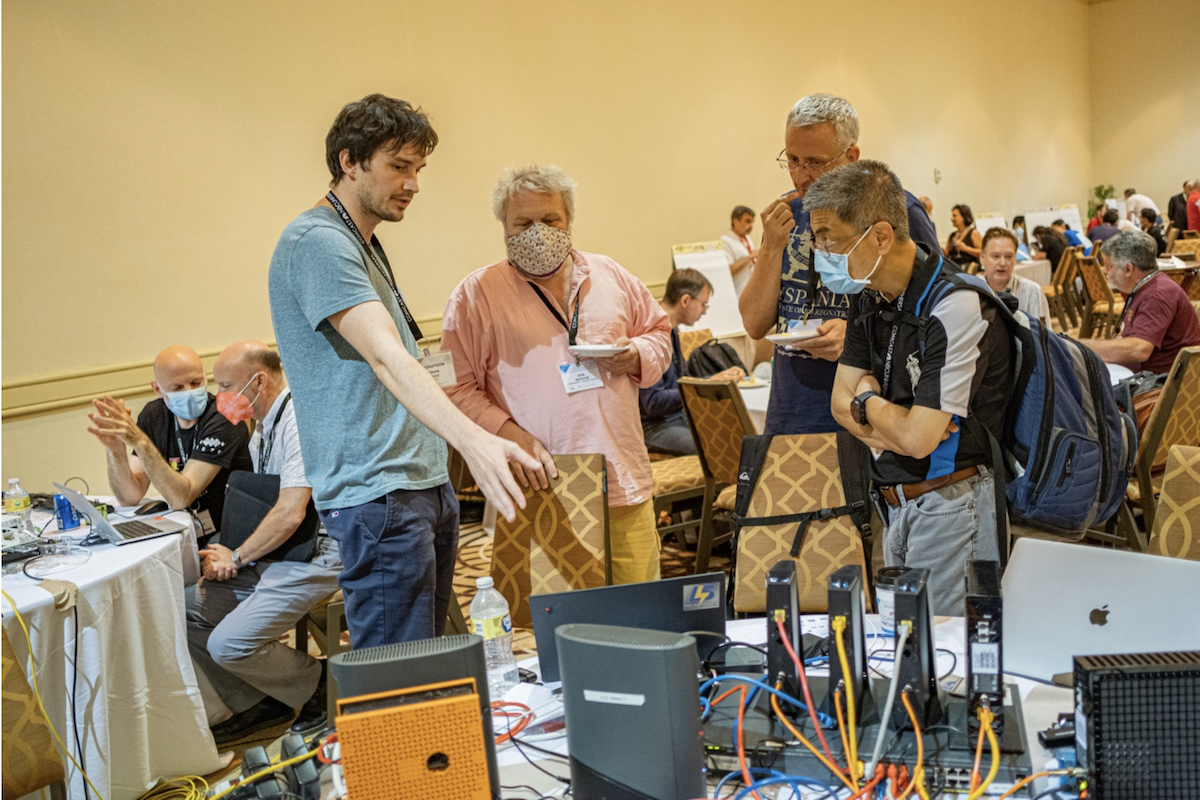Filter by topic and date
IETF 114 Hackathon – Combining Networking Standards, Hardware, and Software
- Charles Eckel IETF Hackathon Co-chair
8 Sep 2022
IETF 114 was held 23-29 July in Philadelphia. As was typical prior to the pandemic, a Hackathon over the weekend served as a great start to the IETF meeting.

While not yet back to pre-pandemic participation levels, the Hackathon was very well attended, with over 150 people in person and another 50 people registered to participate remotely. Together, they worked on 25 projects aimed at advancing the state of the Internet that we all use every day.
IETF Hackathons are collaborative events, not competitions. They are free and open to everyone, including those not attending the IETF meeting. Discussing new ideas, sharing concerns, and finding common ground that improves evolving Internet-Drafts (I-Ds) and deployments of existing Internet standards (defined in RFCs) is as important as developing code that implements or validates the correctness of the protocols and the clarity in which they are documented.
IETF Hackathons attract participants with a wide range of backgrounds and skill sets. Many participants are skillful software developers. Others are subject matter experts who do not consider themselves developers. All are welcome participants and provide valued contributions. One of the greatest benefits of each Hackathon is the mixing of people and ideas that occurs so naturally when we come together for an extended period. Running code created and improved at each Hackathon is valuable, but so are the exchange of ideas, the extension of human networks, and the building of new friendships, respect, and trust.
The IETF 114 Hackathon featured a range of projects spread across essentially all areas of IETF work. Each project is led by one of more champions who volunteer to lead work in a specific area. Project champions welcome and organize members of the team, and they provide focus, guidance, and leadership for the project. Thanks to the efforts of these individuals, IETF Hackathons are welcoming events for newcomers to the IETF and serve as a great introduction to the IETF community. This is evident by the large number of people at each IETF Hackathon for whom the Hackathon is their first experience with the IETF.
In addition to those experiencing their first IETF Hackathon, they were many people for whom the Hackathon was their first in-person meeting since the start of the pandemic. Walking into a room full of masked people you have not seen in person for years, if ever, was exhilarating for some, extremely stressful for others, and likely some combination of both for most people. Despite inherent challenges, everyone seemed happy to be together and to accommodate one another. Any awkward or stressful situations that arose from being in a large group setting were quickly overcome.
Hybrid Format
During the pandemic, the format of the Hackathon was changed to try to accommodate differences in schedules and time zones of participants and teams by running the entire work week prior to the IETF meeting. For IETF 113 and again for IETF 114, the Hackathon switched back to the weekend format, but with the agenda slightly compressed to align more closely with that of the rest of the IETF meeting. The doors opened officially at 09:30 Philadelphia time on Saturday and Sunday, and they closed at 21:00 Saturday and at 16:00 Sunday when the Hackathon ended. This timing aligned more closely with the overall IETF 114 meeting schedule and was intended to ease the pain for remote participants in various time zones.
The official kickoff was 10:30 Saturday and the project results presentations ran from 14:00–16:00 Sunday. These were run using Meetecho, joining those onsite with those participating remotely. The rest of the time was essentially free format, enabling teams to work as they liked and use whatever tools best met their needs. Some teams were entirely in person, others were completely remote, but several teams with an in-person presence benefited from contributions from remote participants. Gather was used successfully by some teams to connect those seated at physical tables in the IETF Hackathon room with those at virtual tables in the Hackathon space in Gather.
Project Results Presentations
Anyone can bring a project to the Hackathon, provided they, or someone else, is willing to lead it. This results in many projects spanning a wide range of IETF work. One common thread across all projects is the goal of advancing the pace and relevance of IETF standards. The project results presentations at the end of the Hackathon provide a forum for teams to share their work with the rest of the IETF community. The presentations are very brief, highlighting the goals, accomplishments, and lessons learned. As such, they serve to start conversations that can continue the following evening at Hackdemo Happy Hour and throughout the IETF meeting week, including appearing as agenda items within related working group sessions.

In total, 17 projects were presented. Slides associated with each presentation are available on GitHub. A recording is available as well. I’d like to call special attention to two of the larger projects, in terms of number of participants, from this Hackathon.
IETF Code Sprints that develop tools that support the work of the IETF have been around since well before the IETF Hackathon came into existence. The IETF 114 Hackathon was fortunate to have the Code Sprint in the same room for the first time. Many Hackathon participants working on other projects, including myself, found themselves at the Code Sprint table to discuss topics of mutual interest. In my case, I was interested in tracking the use of a new mechanism in the IETF Datatracker to associated “related-implementations” with an I-D, RFC, or working group. Kesara Rathnayake, who led the Code Sprint, shared the following:
This Code Sprint was a success. Eighteen participants worked towards over 30 pull requests on Datatracker and xml2rfc, and that momentum continued through the week. It was nice to see more in-person participants this time; compared to the last Code Sprint. I think having the Code Sprint in the same room helped a few participants who wanted to be involved in other Hackathon projects while working on the Code Sprint.
It was tricky to have video conferences with the remote participants this time, but we adapted Zulip as an alternative to interacting with remote participants. Being in the Hackathon room also helped us to have more interactions with other participants who were interested in IETF tools. This might result in more contributions to the open source projects and probably more participants in the next Code Sprint.
Overall, it was a good experience for me and I'm looking forward to the next Hackathon.
— Kesara Rathnayake, IETF LLC
The L4S project attracted a record number of participants and companies, combining IETF standards with state of the art hardware, software development, and interoperability testing. Greg White, one of the leads of the L4S project, provided the following summary:
The IETF-114 Hackathon & Code Lounge played host to the first-ever “L4S Interop Event”, bringing together implementers of the IETF’s “Low Latency, Low Loss, Scalable Throughput” technology. The event, coordinated by CableLabs, Comcast, Apple, and Google, and involving 32 engineers from 15 different organizations, enabled the testing of combinations of five different congestion control algorithms (representing TCP, QUIC and UDP-real-time) across seven different network equipment implementations (including DOCSIS, Wi-Fi & 5G). Much was accomplished during the four days of the event: some implementation bugs were found and - in many cases - fixed, algorithm parameters were tuned, and early benchmarks were calculated. In results shared during the TSVWG session, the L4S flows achieved up to 50x reduction in packet delay variation as compared to Cubic flows! The event was considered to be hugely successful in moving the technology forward and helping application developers, transport protocol developers, network operators, and network equipment developers prepare for deployment.
— Greg White, CableLabs
More information on these and all the other projects, including links to the code, is available on the IETF Hackathon wiki.
Thanks to CNNIC
CNNIC deserves a huge round of thanks for once again sponsoring the Hackathon. We greatly appreciate this sponsorship and welcome and encourage additional sponsors. By sponsoring the Hackathon, you help ensure it remains a free event accessible to everyone. More information is available online.
Tremendous thanks as well to the IETF Secretariat, NOC, LLC, Tools Team, Meetecho, and Gather developers for all their efforts to make IETF Hackathons possible and successful.
Next Hackathon
Planning for the IETF 115 Hackathon is already well underway. It will be 5-6 November, at the start of the IETF 115 meeting in London. We look to build on the momentum and lessons learned from the previous two hybrid Hackathons, and we invite you to join us. Registration is open, both onsite and remote. Subscribe to the Hackathon email list to get all the latest information.